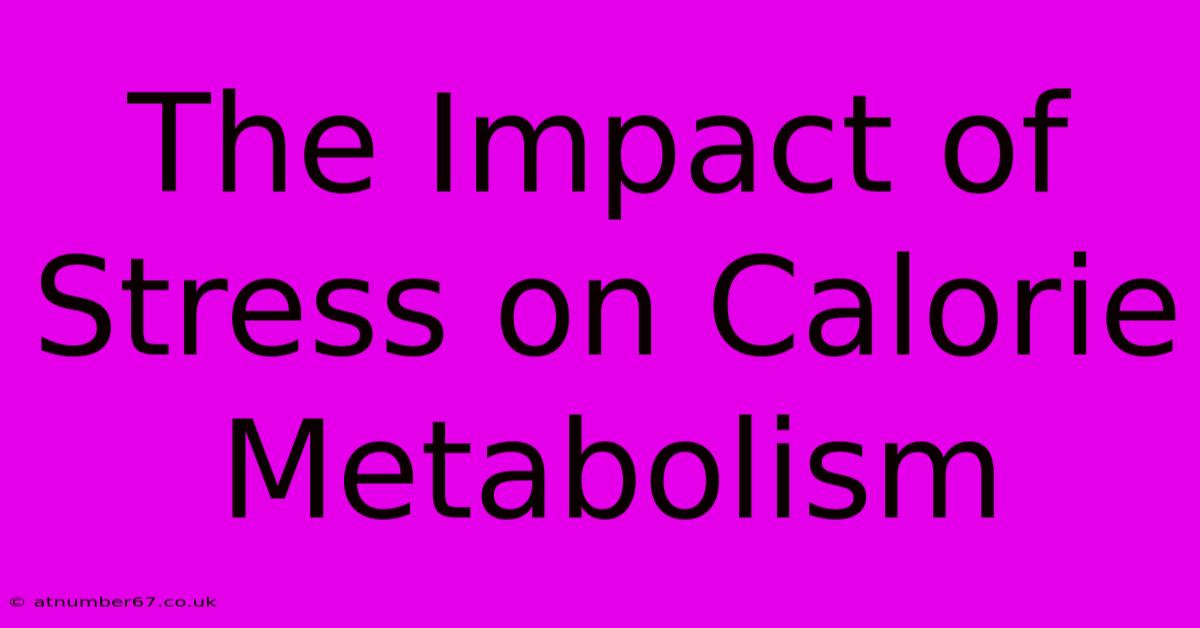The Impact Of Stress On Calorie Metabolism

Table of Contents
- The Impact of Stress on Calorie Metabolism: Understanding the Connection
- The Stress Response and its Metabolic Effects
- Cortisol's Role in Calorie Metabolism
- Other Stress Hormones and Metabolism
- The Vicious Cycle of Stress and Weight Gain
- Breaking the Cycle: Strategies for Healthy Metabolism under Stress
- 1. Stress Management Techniques:**
- 2. Dietary Changes:**
- 3. Regular Physical Activity:**
- Conclusion: A Holistic Approach
The Impact of Stress on Calorie Metabolism: Understanding the Connection
Stress. It's a ubiquitous part of modern life, impacting everything from our sleep to our relationships. But did you know it also significantly affects how our bodies process calories? Understanding the impact of stress on calorie metabolism is crucial for anyone aiming for better health and weight management. This article delves into the complex relationship between stress, hormones, and your body's ability to burn calories.
The Stress Response and its Metabolic Effects
When faced with a stressful situation, your body kicks into "fight or flight" mode. This involves a cascade of hormonal changes, primarily involving cortisol, adrenaline (epinephrine), and norepinephrine. While these hormones are vital for short-term survival, chronic stress leads to persistently elevated levels, disrupting various metabolic processes.
Cortisol's Role in Calorie Metabolism
Cortisol, often called the "stress hormone," plays a central role in this disruption. High levels of cortisol can:
- Increase appetite and cravings: Cortisol signals your body to store energy, often leading to increased hunger, particularly for sugary and fatty foods – a classic example of stress eating.
- Promote fat storage, especially in the abdominal area: This is because cortisol encourages the body to store excess glucose as visceral fat, the dangerous type of fat linked to numerous health problems.
- Impair insulin sensitivity: High cortisol levels can make your cells less responsive to insulin, hindering the body's ability to utilize glucose effectively. This can contribute to weight gain and increase the risk of type 2 diabetes.
- Decrease muscle mass: Chronic stress can lead to muscle breakdown, reducing your resting metabolic rate (RMR) – the number of calories you burn at rest. Less muscle mass means fewer calories burned throughout the day.
Other Stress Hormones and Metabolism
While cortisol is the primary culprit, adrenaline and norepinephrine also contribute to metabolic changes. These hormones increase your heart rate and blood pressure, boosting energy expenditure in the short term. However, prolonged elevation can lead to exhaustion and further disrupt metabolic balance.
The Vicious Cycle of Stress and Weight Gain
The connection between stress and weight gain often creates a vicious cycle. Stress leads to poor eating habits and reduced physical activity, contributing to weight gain. Weight gain, in turn, can exacerbate stress levels, leading to further metabolic disruptions. This cycle highlights the importance of managing stress effectively.
Breaking the Cycle: Strategies for Healthy Metabolism under Stress
Fortunately, there are several effective strategies to mitigate the negative impact of stress on calorie metabolism:
1. Stress Management Techniques:**
- Mindfulness and meditation: These practices can help regulate cortisol levels and promote relaxation.
- Yoga and Tai Chi: These gentle exercises combine physical activity with mindfulness, reducing stress and improving overall well-being.
- Deep breathing exercises: Simple breathing techniques can calm your nervous system and reduce stress responses.
2. Dietary Changes:**
- Prioritize whole, unprocessed foods: Focus on nutrient-rich foods to support healthy metabolism and energy levels.
- Limit sugary and processed foods: These foods contribute to inflammation and can exacerbate the negative effects of stress.
- Maintain regular meal times: Consistent eating helps regulate blood sugar levels and prevents overeating due to hunger.
3. Regular Physical Activity:**
- Engage in regular exercise: Physical activity helps reduce stress hormones and boost metabolism. Aim for a combination of cardio and strength training.
- Prioritize sleep: Adequate sleep is crucial for hormone regulation and metabolic health.
Conclusion: A Holistic Approach
The impact of stress on calorie metabolism is undeniable. Managing stress through a holistic approach that incorporates stress-reduction techniques, healthy dietary choices, and regular exercise is crucial for maintaining a healthy weight and overall well-being. By understanding this complex relationship, you can take proactive steps to protect your metabolic health and break the cycle of stress and weight gain. Remember to consult with a healthcare professional or registered dietitian for personalized advice tailored to your individual needs.

Thank you for visiting our website wich cover about The Impact Of Stress On Calorie Metabolism. We hope the information provided has been useful to you. Feel free to contact us if you have any questions or need further assistance. See you next time and dont miss to bookmark.
Featured Posts
-
The Formula For Success Flavio Briatores Net Worth
Apr 03, 2025
-
Khushi Kapoor Age The Power Of Youth
Apr 03, 2025
-
Beyond The Runs Virat Kohlis Impressive Net Worth
Apr 03, 2025
-
Debunking The Myths About Michael Polanskys Wealth
Apr 03, 2025
-
A Mothers Love Birthday Prayer For My Daughter
Apr 03, 2025
